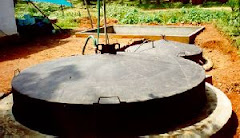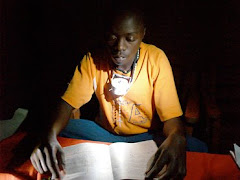the fact is that due to the unusual nature of this project in developing countries such as Cameroon, have local skills and lenders to implement and fund the project should be great challenges. Therefore alternative funding source to finance the project has to be anticipated, one of the option in to create social business opportunities in the NDE. Partnerships will be set between the 14 villages and also open to individuals, businesses, associations, local government who can make available the set-up capital. The board of director will be formed with members from all stakeholders and partners. And the decision making in the project is by single majority of the partners.
Sunday 20 December 2009
Pilot Project to Meet The Millennium Village Goals in NDE (Ouest, Cameroon) : Eco-life and Poverty Alleviation in the Village
NDE Renewable Energy and Sustainable Living Centre
Project Background :
Rural Flight, Global Warming and Poverty (RF-GWP) need to be solved simultaneously in a sustainable and holostic approach. In developing countries such as Cameroon, many people in villages live below the poverty line, which is roughly about $1 a day. This leading to shifting population to the cities and the increasing slums and poverty in the urban areas. One of the approach to solve these issues is by creating villages Social and Sustainable Businesses base on The Millennium Village concepts, which state that: “The Millennium Villages are based on a single powerful idea: impoverished villages can transform themselves and meet the Millennium Development Goals, if they are empowered with proven, powerful, practical technologies. By investing in health, food production, education, access to clean water, and essential infrastructure, these community-led interventions will enable impoverished villages to escape extreme poverty, something that currently confines over 1 billion people worldwide. [© Copyright 2006 Millennium Project]”
source : http://www.unmillenniumproject.org/
This would result in equitable sustainable development of villages and cities and simultaneously mitigating RF-GWP at the same time.
The aims of this project is to develop and Implement a pilot project in the NDE (Ouest Cameroon) to demonstrate and promote, eco-life, energy efficient and renewable energy technologies in Central Africa region. A range of green energy technologies, eco-agro and low energy building materials will be shown. Water, energy, food and power produce and use on site will be monitoring, so that net individual contribution in the village eco-life can be evaluated for dissemination, publication and training purpose.
The first phase of the project will focus on research of the NDE ‘stakeholder’s perception and needs related to sustainable development. Then following by organisation of awareness campaigns and capacity building training for stakeholders including villages’ chiefs, local government, and local strategy/policy makers;The second phase will be the formation of a pilot committee to manage the project, and the executive committee to carry out the board decisions.
In this early phase of the project, the Association is looking to increase its partnerships so that it has a broader knowledge, experience and resource base.
the fact is that due to the unusual nature of this project in developing countries such as Cameroon, have local skills and lenders to implement and fund the project should be great challenges. Therefore alternative funding source to finance the project has to be anticipated, one of the option in to create social business opportunities in the NDE. Partnerships will be set between the 14 villages and also open to individuals, businesses, associations, local government who can make available the set-up capital. The board of director will be formed with members from all stakeholders and partners. And the decision making in the project is by single majority of the partners.
the fact is that due to the unusual nature of this project in developing countries such as Cameroon, have local skills and lenders to implement and fund the project should be great challenges. Therefore alternative funding source to finance the project has to be anticipated, one of the option in to create social business opportunities in the NDE. Partnerships will be set between the 14 villages and also open to individuals, businesses, associations, local government who can make available the set-up capital. The board of director will be formed with members from all stakeholders and partners. And the decision making in the project is by single majority of the partners.
After the overheads, profit could be distributed as follows: 50% to divide in equal parts to project partners, 10 % to all 14 villages’ chiefs in the NDE, 20% to a fund for the local development such as schools, local market, and health centre in the NDE department, 20% to a fund to carry on ARPEDAC objectives, such as implementing and promoting energy efficiency and renewable energy technologies in the NDE villages,
Priority for purchasing products and services should be given to local contractors and suppliers.
.png)
.png)




.png)


.png)
.png)
.bmp)


.png)


.bmp)
.bmp)
.bmp)
.bmp)
.png)
.png)

.png)



.png)